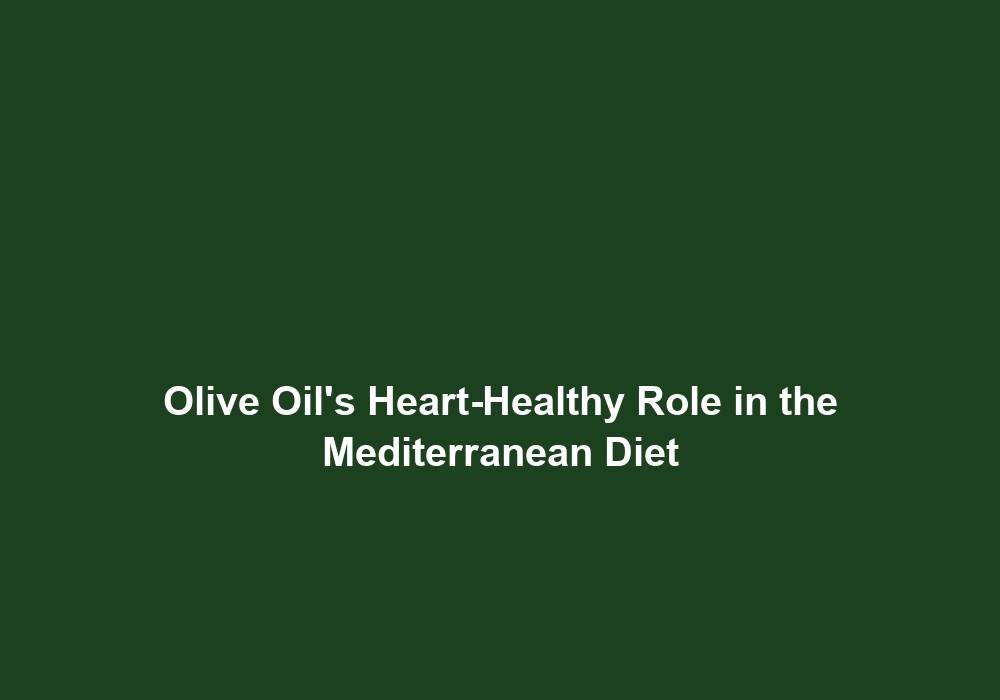Olive Oil’s Heart-Healthy Role in the Mediterranean Diet
Olive oil has long been celebrated for its numerous health benefits, particularly its significant role in promoting heart health within the context of the Mediterranean diet. This golden elixir, derived from the fruit of the olive tree, has been a staple in Mediterranean cuisine for centuries. The Mediterranean diet, renowned for its ability to reduce the risk of heart disease, stroke, and other chronic illnesses, owes much of its success to the consumption of olive oil. In this article, we will explore the heart-healthy properties of olive oil and delve into why it is a crucial component of the Mediterranean diet.
The Mediterranean Diet: An Overview
The Mediterranean diet is not merely a short-term weight loss plan, but rather a lifestyle that focuses on consuming whole, unprocessed foods in moderation. It emphasizes the consumption of fruits, vegetables, whole grains, legumes, nuts, seeds, fish, and of course, olive oil. Red meat, processed foods, and sugary treats are limited in this diet.
The Mediterranean diet is widely recognized as one of the healthiest diets in the world. It is associated with numerous health benefits, including reduced risk of heart disease, lower levels of inflammation, improved brain function, and a longer lifespan. This diet is rich in nutrients, antioxidants, and healthy fats, which work together to support overall heart health.
The Health Benefits of Olive Oil
Olive oil provides an array of health benefits, with its heart-protective properties being among the most notable. Here are some key benefits:
1. Rich in Monounsaturated Fats: Olive oil is primarily composed of monounsaturated fats, specifically oleic acid. These healthy fats help reduce LDL (bad) cholesterol levels while increasing HDL (good) cholesterol levels, thus improving overall heart health. By incorporating olive oil into your diet, you can help maintain healthy cholesterol levels and reduce the risk of heart disease.
2. Antioxidant Powerhouse: Olive oil contains an abundance of antioxidants, such as polyphenols and vitamin E. These antioxidants combat oxidative stress and inflammation, which are key drivers of cardiovascular diseases. The polyphenols in olive oil have been shown to have anti-inflammatory and anti-cancer properties, further contributing to heart health.
3. Anti-Inflammatory Effects: Chronic inflammation is a significant contributor to cardiovascular diseases. Olive oil’s anti-inflammatory properties help reduce inflammation markers in the body, promoting heart health. The polyphenols in olive oil have been found to inhibit the production of inflammatory substances in the body, thereby reducing the risk of heart disease.
4. Blood Pressure Regulation: High blood pressure is a major risk factor for heart disease. Studies have shown that regular consumption of olive oil can help lower blood pressure levels, leading to improved cardiovascular health. The monounsaturated fats in olive oil have been found to improve blood vessel function and reduce blood pressure, thus reducing the risk of heart disease.
5. Blood Sugar Control: Diabetes and heart disease often go hand in hand. Olive oil has been found to enhance insulin sensitivity and regulate blood sugar levels, ultimately reducing the risk of heart complications in diabetics. The monounsaturated fats in olive oil can improve insulin sensitivity and help control blood sugar levels, reducing the risk of heart disease in individuals with diabetes.
Incorporating Olive Oil into the Mediterranean Diet
Now that we understand the incredible health benefits of olive oil, let’s explore how it can be incorporated into the Mediterranean diet:
1. Cooking and Baking: Olive oil is an excellent alternative to butter and other oils when cooking or baking. Its mild, fruity flavor adds a delightful taste to dishes, while its heat stability makes it suitable for a variety of cooking methods. Use olive oil for sautéing vegetables, roasting meats, or even as a replacement for butter in baking recipes.
2. Salad Dressings and Marinades: Whisking olive oil with vinegar or lemon juice creates a simple yet delicious salad dressing. Adding herbs and spices can further enhance the flavor. Similarly, olive oil can be used as a marinade for meat, fish, or vegetables, infusing them with its distinctive Mediterranean taste. Marinating proteins in olive oil can help tenderize and flavor them before cooking.
3. Dipping Oil: In Mediterranean countries, it is common to enjoy a crusty piece of bread dipped in a high-quality extra virgin olive oil. This simple yet satisfying appetizer showcases the true flavors of olive oil. You can also add herbs, spices, or even balsamic vinegar to the olive oil for added flavor.
4. Drizzling and Finishing Touch: After cooking, drizzle a small amount of olive oil over roasted vegetables, grilled meats, or even soups and stews. This finishing touch adds richness and depth to the dish, elevating its taste and nutritional profile. The flavors of olive oil complement a wide range of foods, enhancing their natural flavors.
Choosing the Right Olive Oil
When incorporating olive oil into your diet, it is important to choose the right type. Here are some tips:
1. Extra Virgin Olive Oil (EVOO): Extra virgin olive oil is the highest quality and least processed form of olive oil. It is extracted by cold-pressing olives, preserving its natural antioxidants and flavor. Look for reputable brands and ensure the oil is certified as extra virgin. Extra virgin olive oil has a more pronounced flavor and is best suited for drizzling and finishing dishes.
2. Organic and Cold-Pressed: Opt for organic, cold-pressed olive oil whenever possible. Organic oils are free from harmful pesticides, while cold-pressed oils retain more nutrients due to the absence of high heat during extraction. These oils are the purest form of olive oil and offer the greatest health benefits.
3. Storage and Expiration: To maintain the quality of your olive oil, store it in a cool, dark place away from direct sunlight. Olive oil has a shelf life of approximately two years from the time of production, so it’s essential to check the expiration date before use. Proper storage will ensure that your olive oil remains fresh and retains its flavor and nutritional properties.
Conclusion
In conclusion, olive oil plays a significant role in promoting heart health as part of the Mediterranean diet. Its abundance of monounsaturated fats, antioxidants, anti-inflammatory properties, and positive effects on blood pressure and blood sugar make it an ideal choice for maintaining cardiovascular well-being. By incorporating olive oil into your daily meals, whether through cooking, salad dressings, or as a finishing touch, you can enjoy its numerous health benefits while savoring the flavors of the Mediterranean. Choose high-quality, extra virgin olive oil, and embark on a heart-healthy journey with every delightful drizzle.







